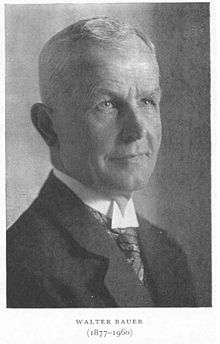Walter Bauer

Walter Bauer (German: [ˈbaʊɐ]; August 8, 1877 – November 17, 1960) was a German theologian, famous lexicographer of New Testament Greek, and scholar of the development of the early Christian churches.
Life
Bauer was born in Königsberg, East Prussia, and raised in Marburg,[1] where his father was a professor. He studied theology at the universities of Marburg, Strassburg, and Berlin. Bauer taught at Breslau and Göttingen, where he later died.
Teachings
In his Rechtgläubigkeit und Ketzerei im ältesten Christentum (Tübingen 1934; a second edition, edited by Georg Strecker, Tübingen 1964, was translated as Orthodoxy and Heresy in Earliest Christianity 1971), Bauer developed his thesis that in earliest Christianity, orthodoxy and heresy do not stand in relation to one another as primary to secondary but, in many regions, heresy is the original manifestation of Christianity. Bauer reassessed as a historian the overwhelmingly dominant view[2] that for the period of Christian origins, ecclesiastical doctrine already represented what is primary, while heresies, on the other hand somehow are a deviation from the genuine (Bauer, "Introduction").
Bauer's translator, Robert A. Kraft, characterized his sophisticated, nuanced writing style, which
- "presents a complex and frustrating problem for the translator who hopes to capture something of the "tone" or "flavor" of the original as well as representing accurately its content. Bauer writes in a dynamic and highly sophisticated manner, mixing precision with irony and even insinuation, pictorial language with careful presentation of the historical evidence, hypotheses and caveats with the subtle use of overstatement and understatement in cleverly nuanced expressions. His German is literary but not necessarily formal. Long sentences with closely interrelated parts appear alongside brief, sometimes cryptic or oblique comments couched in clever, often scholarly German idiom. Frequently the presentation flows along rapidly in an exciting manner, despite the difficulties of the subject matter— but its flow is such that the motion is difficult to capture in translation, and is sometimes even difficult to follow in the original."
Through studies of historical records Bauer concluded that what came to be known as orthodoxy was just one of numerous forms of Christianity in the early centuries. It was the eventual form of Christianity practiced in the 4th century that influenced the development of orthodoxy[3] and acquired the majority of converts over time. This was largely due to the conversion to Christianity of the Roman Emperor Constantine I and consequently the greater resources available to the Christians in the eastern Roman empire capital he established (Constantinople). Practitioners of what became orthodoxy then rewrote the history of the conflict making it appear that this view had always been the majority one. Writings in support of other views were systematically destroyed.
Bauer's conclusions contradicted nearly 1600 years of writing on church history and thus were met with much skepticism[4] among Christian academics such as Walther Völker (see below).
The cultural isolation of Nazi Germany precluded a wider dissemination of Bauer's ideas until after World War II; in the international field of biblical scholarship, Bauer continued to be known solely as the compiler of the monumental Wörterbuch zu den Schriften des Neuen Testaments (in its English translation A Greek-English Lexicon of the New Testament and Other Early Christian Literature or simply the Bauer Lexicon), which has become standard. Rechtgläubigkeit und Ketzerei was finally translated into English in 1970 and published in 1971.[5]
See also
Notes
- ↑ Boring, M. Eugene (2007). "Bauer, Walter". In McKim, Donald K. Dictionary of major biblical interpreters (2nd ed.). Downers Grove, Ill.: IVP Academic. p. 172. ISBN 978-0-8308-2927-9.
- ↑ Bauer (1964:3f) instanced Origen, Commentarius II in Cant., and Sel. in Proverb. and Tertullian, De praescript. haer. 36 as espousing the traditional theory of the relation of heresy.
- ↑ See Bauer's concise epitome of Rechtgläubigkeit in Bauer, Aufsätze und Kleine Schriften, Georg Strecker, ed. Tübingen, 1967, pp 229-33.
- ↑ Reviews and responses to Bauer are cited in Georg Strecker, "Die Aufnahme des Buches" in Rechtgläubigkeit, 1964, pp 288-306; a "completely revised and expanded version of Strecker's essay by Robert A. Kraft appears in the English translation, 1971, pp 286-316; see also Daniel J. Harrington, "The Reception of Walter Bauer's "Orthodoxy and Heresy in Earliest Christianity" during the Last Decade", The Harvard Theological Review 73.1/2 (January - April 1980), pp. 289-298.
- ↑ Helmut Koester, "Häretiker im Urchristentum" RGG, 3rd ed. III pp 17-21, gives a bibliography of works influenced by Bauer.
References
- Walter Bauer, 1971. Orthodoxy and Heresy in Earliest Christianity (Philadelphia: Fortress) ISBN 0-8006-1363-5.
- Bart D Ehrman, 2002. Lost Christianities: Christian Scriptures and the Battles over Authentication (Chantilly VA: The Teaching Company), Lesson 19, pg 28.
- Early criticism
- David L Hawkin, "Thirty Years Later: a retrospective on the significance of B. E. W. Turner's The Pattern of Christian Truth," in Churchman 99.1 (1985): 51-56.
- Walther Völker, "Walter Bauer's Rechtgläubigkeit und Ketzerei im ältesten Christentum", translated by Thomas P. Scheck in Journal of Early Christian Studies 14.4 (2006): 399-405. Originally published in Zeitschrift für Kirchengeschichte 54 (1935): 628–31.